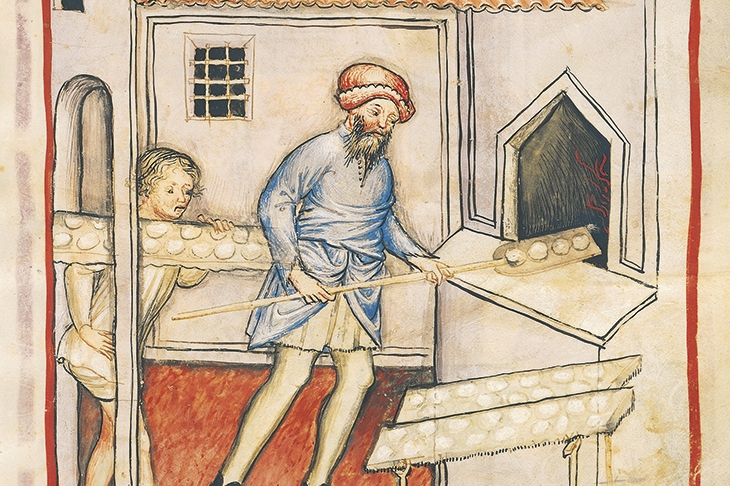In the seventh and final chapter of this small but lingeringly powerful book, the author reveals his motivation for writing it. His father, he explains, a Russian-born Yugoslav soldier, had been a prisoner of war of the Germans, part of a group consigned to do forced labour felling trees during the bitterly cold winter of 1942-43. One evening, freezing, starving and looking barely human, the group was stopped on the road back to camp by a stranger, a Protestant pastor who invited them into his house and, risking reprisals, nonetheless gave them a chance to warm up and eat some bread with a glass of wine.
After the war, living in a small town where captured German soldiers were often paraded in the street and treated vengefully, the former prisoner of war remembered how he had once been shown human warmth at a critical moment and instructed his young son to take some bread to the prisoners. This involved ceremoniously cutting in half the one loaf of bread that his entire family received as a weekly ration, hiding it under his shirt, then surreptitiously giving it to a German prisoner, whose eyes welled up with tears.
Predrag Matvejevic, a Bosnian Croat philosopher and academic, says he never forgot his father’s story, and for years wanted to write about the history and significance of bread. Although he often started, just as frequently he abandoned the project, emigrated from his country and wrote different books. Finally, in his late seventies, he produced this meditation on why bread is much more than merely food, yet its publication now (for the first time in English) is posthumous.
Bread being so precious, bakers and millers were often exposed to danger, so needed their own patron saints
Our Daily Bread contains some profound ideas about life. It is both a celebration of and a lament for bread, as the author meanders through connections to history, art and literature. Bread, this most basic and vital foodstuff, is older than books and older than writing, yet no one knows precisely when or where the first ear of grain sprouted — just that the journey from raw to cooked grain was long. Nomads had to settle in order to plough and till the land.
Matvejevic cites the Iliad — ‘Women sprinkled much white flour upon it’ — to show how the division of labour crept in early, with men working in the field sowing and reaping while women kneaded and baked. The book is rich in biblical quotations, including Pharoah’s famous dream, interpreted by Joseph, that he had three baskets of white bread on his head, which, according to Matvejevic, shows how bread moved from reality to dreams, then from dreams to reality, ‘finding their place in the soul and in the body’.
Among the random facts that I learned in this unusual volume were that since Roman times bakers began to organise themselves in guilds, and the emperor Trajan issued a decree that any foreigner who worked as a baker and baked enough measures of bread over three consecutive years should enjoy the same rights as a Roman citizen, while, even after the division of the empire, the Theodosian code protected the orphans of bakers.
Because bread is so precious, bakers and millers were often exposed to danger, so they needed their own patron saints — who, ‘despite their number, were not always much help’. While the phrase ‘bread and water’ means suffering and prison, some prisoners can apparently live on bread and water for ten years. Years after he was released from the gulag, the Russian author Alexander Solzhenitsyn always placed a piece of bread under his pillow.
There is much space devoted to the importance of bread for sailors, who had to survive for months at a time at sea, and archive records show the need for plenty of flour as well as wood for the ovens. Before setting sail from Spain, Christopher Columbus loaded all the things required for a voyage to the Indies and high on the list of foodstuffs were flour, wine and biscuits, along with drinking water and wood. Bread, although equally important for soldiers, was easier to obtain on land, and armies were well known for pillaging grain. For pilgrims and some monks living in remote mountain monasteries, bread had to last for long periods, daily becoming harder and more difficult to digest, so they softened it by adding water.
I love bread. Homemade crusty bread (and cheese) would be my desert island luxury. So, like many in lockdown, I discovered the ancient and soothing pleasure of baking my own sourdough. The rituals of feeding the strong-smelling starter (or ‘mother’) and watching the power of natural bubbling yeast magically lift the flour into something quite different and delicious gave not only the bread but the day a structure. Reading this book helped explain why I am not alone. Bread since time immemorial and the world over is much more than merely an accompaniment to a meal, and many of us remember a place for its association with a distinctive type of flat, round, plaited, seeded, soft or hard bread.
And yet, as Matvejevic concludes, we should also remember, as we crunch our rye bagels or sourdough, that millions of people are still today starving and cannot hope for their daily bread. Hunger remains a common thing. Read this and never again take ‘daily bread’ for granted.





Comments